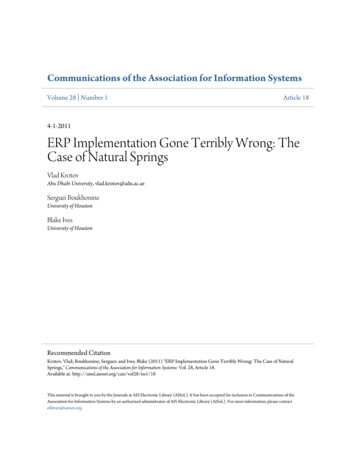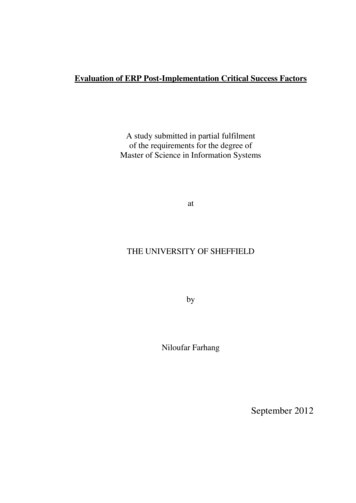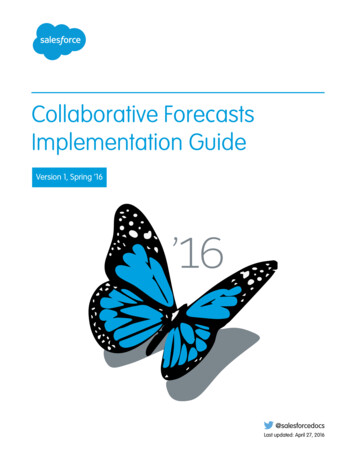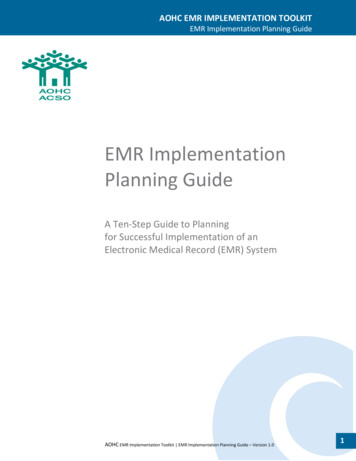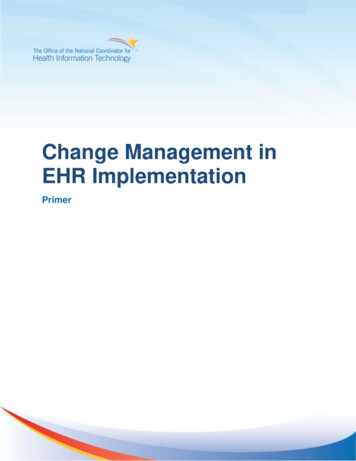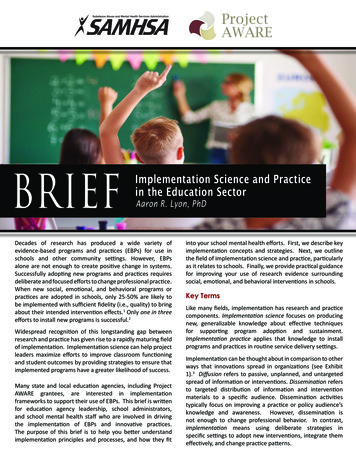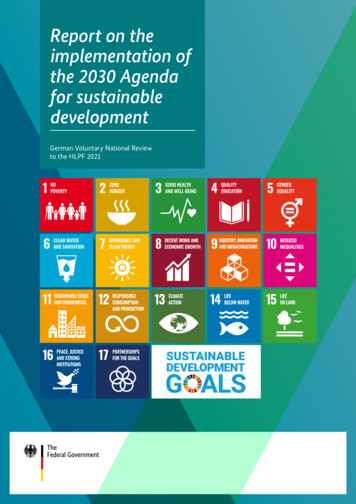
Transcription
Report on theimplementation ofthe 2030 Agendafor sustainabledevelopmentGerman Voluntary National Reviewto the HLPF 20211
German Voluntary National Review to the HLPF 2021
All states are called upon to take swifter andmore ambitious action to implement the Agenda.With the update to the German SustainableDevelopment Strategy [adopted in March 2021],the German Government therefore aims to pickup the pace on the path to greater sustainability,both at home and in international cooperation.[.] If we are to achieve the goals of the GermanSustainable Development Strategy and the 2030Agenda for Sustainable Development, we mustembark on a truly demanding transformation ofkey areas such as energy, the circular economy,housing, transport, food and agriculture. InGermany we plan to advance the transformationprocess by updating our German SustainableDevelopment Strategy and by harnessingeducation, research and innovation.(Federal Chancellor Dr. Angela Merkel in her foreword to theupdated German Sustainable Development Strategy)German Voluntary National Review to the HLPF 20213
4
Content1. Key messages 1.1 The twofold challenge: Pandemic response and the transition to sustainabledevelopment for a better and green recovery 1.2 Main areas of transition, unhalted by the pandemic response, within the leitmotifsof the 2030 Agenda: People, planet, prosperity, peace and partnership 1.3 Joint action; global responsibility; peace and security 789142. Institutional and procedural aspects 173. Important changes 234. Pursuit of the 17 SDGs in, by and in partnership with Germany 27SDG 1: End poverty in all its forms everywhere SDG 2 End hunger, achieve food security and im proved nutrition, andpromote sustainable agriculture SDG 3 Ensure healthy lives and promote well-being for all at all ages SDG 4 Ensure inclusive and equitable quality education and promote lifelong learningopportunities for all SDG 5 Achieve gender equality and empower all women and girls SDG 6 Ensure availability and sustainable management of water and sanitation for all SDG 7 Ensure access to affordable, reliable, sustainable and modern energy for all SDG 8 Promote sustained, inclusive and sustainable economic growth, full andproductive employment and decent work for all SDG 9 Build resilient infra structure, promote inclusive and sustainable industrialisationand foster innovation SDG 10 Reduce inequality within and among countries SDG 11 Make cities and human settlements inclusive, safe, resilient and sustainable SDG 12 Ensure sustainable consumption and production patterns SDG 13 Take urgent action to combat climate change and its impacts SDG 14 Conserve and sustainably use the oceans, seas and marine resources forsustainable development SDG 15 Protect, restore and promote sustainable use of terrestrial ecosystems,sustainably manage forests, combat desertification, halt and reverse land degradation,and halt biodiversity loss SDG 16 Promote peaceful and inclusive societies for sustainable development,provide access to justice for all and build effective, accountable and inclusiveinstitutions at all levels SDG 17 Strengthen the means of implementation and revitalise the Global Partnershipfor Sustainable Development 303440465258626674788490961001041101165. Outlook 123Annex: Position papers of major German stakeholders 127German Voluntary National Review to the HLPF 20215
6German Voluntary National Review to the HLPF 2021
1. Key messagesGerman Voluntary National Review to the HLPF 20217
Key messages1.1 The twofold challenge:Pandemic response and the transition to sustainabledevelopment for a better and green recoveryWith its 17 Sustainable Development Goals(SDGs), the 2030 Agenda is a guiding principle ofGerman Government policy. In September 2019,the heads of state and government attending theSDG Summit in New York determined that thosegoals shared by the international communitycould not be achieved by 2030 if the currenttrends continued.The 2020-2030 Decade of Action declared by theUnited Nations must live up to its name andensure greater sustainability, thereby also enhancing climate action and intergenerational as well asinterregional justice.Action to date falls far short of what is needed tostart on a sustainable development route thattruly does justice to the interests of future generations. In its latest order on climate legislation inGermany, the Federal Constitutional Courthighlighted the importance of intergenerationalequity. This is what lies at the heart of sustainabledevelopment: the necessity of maintaining scopefor action and for decisions to pass on to youngerand future generations, as raised by the Brundtland Commission back in 1987. Its report says thatdevelopment is sustainable if it meets the needs ofthe present without compromising the ability offuture generations to meet their own needs andchoose their own lifestyles. In the same order, theCourt also underlined the global dimension ofclimate action and obliged the state to act with aninternational focus to protect the climate on aglobal scale.8With its European Green Deal, the EuropeanUnion has set itself demanding objectives forsustainable economic activity and more climateaction: the EU is to cut its greenhouse gas emissions by at least 55% compared with 1990 levels by2030 and become climate neutral by 2050. Asocio-environmental transition to sustainabledevelopment requires corresponding efforts, notonly with a view to protecting the climate, in thekey areas of transition set out below.The pressure to act on this has intensified aroundthe world in the face of the COVID 19 pandemic.Simultaneously, however, this difficult time hasbrought the growing realisation that globalchallenges can be overcome only by global effortsand that unsustainable activity makes us strikinglyvulnerable.Worldwide, in Europe and in Germany, therefore,it has been and remains strategically important forrecovery programmes during and after thepandemic to set the course for a more sustainableand thus more future-proof society – in otherwords, to pursue a better and green recovery. Atthe national, European and international levels,policies and programmes in response to theCOVID 19 crisis must be aligned with the 2030Agenda and its SDGs and guided at all times by theAgenda’s principle of leaving no one behind.Like the updated German Sustainable Development Strategy that the German Governmentadopted in March 2021, the present report includes federal action responding to the pandemicand simultaneously consolidating the necessarypreconditions for a sustainable future in Germany,in Europe and around the world.German Voluntary National Review to the HLPF 2021
Key messages1.2 Main areas of transition, unhalted by the pandemic response, within the leitmotifs of the 2030 Agenda:People, planet, prosperity, peace and partnershipProgress in the following six areas of transition is pivotal to implementation of the 2030Agenda in, with and by Germany.1The human well-being and capabilities; socialjustice transition area links SDGs 1, 3, 4, 5, 8, 9 and10. The present and future well-being of all peopleis at the heart of sustainable development. Morethan any that have gone before, the currentgeneration has the knowledge and the means toshape the future in a sustainable manner. The taskis to secure each person’s fundamental rights andbasic needs, protect them from existential threats,foster their prosperity and enable them to livesustainably. It is a task to be tackled across a largenumber of policy areas.To facilitate human well-being around the world,human rights must be upheld, work paid appropriately, social security generated, gender-specificinequalities tackled and social structures changedthat prevent marginalised sections of society andminorities living a self-determined life. Theobjective is to ensure that global value chainsrespect these aspects from start to finish, a task forwhich states and businesses are equally responsible. Another key challenge is to reduce inequalitiesin order to open up prospects of economic andsocial development to all and to stabilise theeffectiveness of democracies around the world.German Voluntary National Review to the HLPF 2021The German Government is pursuing 25 nationaland international human rights priorities usingthe framework of its 2021-2022 Action Plan forHuman Rights. These correlate in large part withthe 17 SGDs, which are covered in this report.Not just the COVID 19 pandemic demonstrateshow crucial good health and well-being are tosurvival. Germany is actively committed toensuring that the lessons of COVID 19 are takeninto account in future efforts to reshape the globalhealth architecture. Interdisciplinary perspectivesthat place human health in the broader context ofanimal and environmental health are becomingincreasingly important. That is why the GermanGovernment promotes the One Health approachat the national, regional and international levelsand champions protecting the health of farm andwild animals as well as biodiversity and naturalhabitats. An important element of healthcare isupholding and ensuring access to sexual andreproductive healthcare and rights, which theGerman Government campaigns for across theglobe. In this context, education, science andresearch form the basis of a self-determined,responsible life while paving the way for theachievement of all sustainability targets.9
Key messages2The transition area focused on climate action andenergy transition (SDGs 13 and 7) demands anintegrated approach based on climate protectionthat transcends the boundaries of different policyareas and SDGs. On the basis of decisions from theEU and in consideration of the latest order issuedby the Federal Constitutional Court, the GermanGovernment submitted the bill for a revisedFederal Climate Change Act (Bundes-Klimaschutzgesetz) on 12 May 2021. The new version setsa stricter target for greenhouse gas emissions: areduction of at least 65% by 2030 compared with1990 levels, instead of the previous 55%. Emissionsfrom different parts of the economy are to be keptbelow sector-specific thresholds that will belowered year on year. Greenhouse gas emissionsare to be cut by at least 88% by 2040, and greenhouse gas neutrality is to be achieved by 2045. Inaccordance with this trajectory, electricity supplywill be overwhelmingly decarbonised in the 2030s.Furthermore, a crucial precondition of achievingthe climate goals is to save energy and use it moreefficiently. Research and innovation will play animportant role in driving progress towards thatobjective. This may also open up new value-creation potential for Germany as a venue forbusiness and industry. The Federal ConstitutionalCourt moreover emphasised the internationaldimension of the constitutional imperative toprotect the climate. The German Government willcontinue to push consistently for significantprogress on climate action and sustainability onthe world stage. It will increase its efforts in thefield of international climate and sustainabledevelopment policy.3The circular economy transition area (SDGs 8, 9, 11,12, 13 and 14) responds to the need to decouplegrowth from resource consumption. Consumption and production must remain within planetary boundaries. This means not only looking atconsumption by the individual but also reworkingthe models of value creation that underlie production processes. Resource efficiency, the circulareconomy and sustainable supply chains areequally as essential as preventing waste wherepossible, and recycling or disposing of it responsibly where not. Germany is committed to itsglobally pioneering role in ambitiously developingthe circular economy, reducing the use of resources and appreciably increasing resource efficiencyas well as in harnessing the potential of digitalisa-10tion to the pursuit of sustainable economicactivity. With regulatory steps like the CorporateDue Diligence in Supply Chains Act, incentiveschemes, voluntary approaches and the promotion of multi-stakeholder partnerships involvingbusinesses, trade unions and civil society, Germany is actively contributing to globally moresustainable, resource-efficient value and supplychains. On 26 April 2021, an update to the Programme on Sustainable Consumption was agreedby the Secretaries’ Committee on SustainableDevelopment.German Voluntary National Review to the HLPF 2021
Key messages4Construction and buildings, as well as the transport sector, are addressed as part of the transitionarea on sustainable building and the transformation of transport. It is linked to SDGs 7, 8, 9, 11, 12and 13. Just like the other transition areas, thereare synergies with other topics relating to sustainability. Given its upstream and downstreamprocesses, the construction and buildings sector isclosely interwoven with other areas of transition.Sustainable construction requirements coverenergy efficiency and climate neutrality, biodiversity safeguards, resource conservation and the useof renewable raw materials, a reduction in landuse, the sustainable procurement of products andservices, including respect for human rights insupply chains, and measures to ensure the healthand comfort of users.general public. Mobility is an essential element oflife in society that must remain accessible andaffordable to all people. At the same time, mobilitymust be more responsive to environmental andclimate-related concerns to make the transporttransition a success. To guide this process towardssustainability, in September 2018 the GermanGovernment launched the National Future ofMobility platform. Since the beginning of 2021,further powerful leverage has come from theintroduction of carbon pricing in the transportsector (alongside the heating sector). There mustbe a particular effort to bring technologicalinnovations and developments in alternative drivetechnologies and fuels etc. to market quickly, to dofull justice to our evolving mobility needs and therole of the transport sector in climate action.All of these requirements demand an approachinvolving different ministries and sectors. Takingall aspects into account, buildings are responsiblefor around 40% of greenhouse gas emissions. TheGerman Government will therefore put evenmore effort into promoting sustainable, climate-neutral construction and will draw up aninterdepartmental action plan in the course of2021. The action plan will focus, for example, onexpanding the promotion of accredited certification for sustainable building and developing asimplified procedure for auditing a building’senvironmental credentials that can be used by theGerman Voluntary National Review to the HLPF 202111
Key messages5A holistic perspective is required to achieveprogress in the sustainable agricultural and foodsystems transition area, which ties in with SDGs 2and 3 with further links to SDGs 12 and 15. Theterm “food systems” describes the complexinterrelationships and interdependencies betweenthe ways in which agricultural commodities areproduced, processed and transported and howfoodstuffs are consumed and handled.The German Government supports the integratedapproach also followed by the UN Food andAgriculture Organization (FAO) and is working toenhance food systems in Germany and the EU toreflect the SDGs more closely. Organic farmingwill play an important role in this not only inGermany and Europe, where it is to make up 20%and 25% of the sector respectively by 2030, butaround the world. Further measures includeenhancing sustainability in mass catering andreducing food waste. In practice, this meansjointly formulating national, European andinternational food, agricultural, forestry, fisheries,climate, environment and health policy, anddesigning strategies and measures in the sameway. The aim here is to ensure a sufficient supplyof a variety of safe, affordable foodstuffs, as well asa healthy diet for everyone around the world. Atthe same time, environmental and climateprotections must be guaranteed, conditions andhealthcare for farm animals improved, producers’rights respected and their working and livingconditions upgraded, and rural areas made moreattractive as places to live and work.6A pollutant-free environment provides the basisfor health and well-being, including both physicaland mental health. In addition to all of theenvironment-related SDGs (6, 13, 14, and 15), thisarea of transition also affects some of the socialgoals (SDGs 3 and 11), and impacts indirectly onthe economic ones, especially SDG 8.12The German Government regards the AssessmentSystem for Sustainable Building as well as environmental law, with its interplay of requirementsunder chemicals law, water and emissions safeguards and legislation on waste, as the mainjumping-off points from which to achieve apollutant-free environment. Consumer awarenessabout the implications of purchasing decisionsshould also be raised by a targeted informationcampaign.German Voluntary National Review to the HLPF 2021
Key messagesThe German Government has identified theprimary transformative measures for these sixareas that will be used to achieve measurableprogress in each case. They are set out in Chapter 4below. The policies and measures are implemented at three levels: focusing on implementationand effect in Germany, focusing on internationalimpact and focusing on supporting partnercountries. The figure below shows how the areasof transition relate to the off-track indicators, i.e.those targets and measures within the GermanSustainable Development Strategy where action isparticularly required, as well as the key measuresthe German Government is undertaking in thoseareas.Ke y m e a s u r e sRefinement of Europeanenvironmental andNational Air Pollution chemical law; internationalmeasuresControl ProgrammePrevention ofmarine litterSoils/forestsas carbon sinksDigital Pact for SchoolsLivestock StrategyStrategy for the Future ofOrganic Farming2035 Arable FarmingStrategyOrganic farming(2.1.b)Nutri-ScoreFood wasteDeforestation-freesupply chainsAction Programmefor InsectConservationNational Food SystemsSummit DialogueRound Table on ResourceEfficiency in CivilEngineeringFederal Funding forEfficient Buildings(sustainability class)Nitrate ingroundwater(6.1.b)Nitrogen input,Baltic Sea (14.1.aa)Phosphorus in flowingwaters (6.1.a)Nitrogen input,North Sea (14.1.ab)Pollutant-freeenvironmentSustainable fishing,North and Baltic Seas(14.1.b)Obesity rateamong adults (3.1.f)Additional support forresearchIncentives for electriccars and trucksSustainablebuilding and thetransformation oftransportationCarbon pricing in the transport sectorExpert network onsustainable building in DCModal shift in passengerand goods trafficTransformativeUrban MobilityInitiativeProgramme forSustainableConsumptionFive-Point Plan forless plastic waste andmore recyclingPAGE, GO4SDGs2030 Climate ActionProgrammeClimate Change ActProducts withEMASpublicly managedeco-manage- Private consumment (12.2) ption CO2 emissions ecolabels (12.1.a)(12.1.bc)Sustainableproduct designSustainablefinance policyFinal energyproductivity(7.1.a)Greenhouse gasemissions(13.1.a)rack indicatorDue diligenceobligationsForeign schoolgraduates (10.1)Primary energyconsumption (7.1.b)CirculareconomyBusiness supportmeasuresR&D expenditure(9.1.a)Energy transitionand climateactionOff-tOne HealthGender pay gap(5.1.a)Areas oftransitionFinal energyconsumption ingoods transport(11.2.a)Measures to improve theefficiency and digitalisationof cars and trucksUse of alternative,regenerative fuelsResearch forSustainability (FONA)All-day care provision,0–5 year-olds (4.2.a/b)Human wellbeing andcapabilities;social justiceSustainableagricultureand foodsystemsNitrogen surplus(2.1.a)Support for Länder andlocal governmentPrematuremortality(3.1.a/b)Early school leavers(4.1.a)Biodiversity (15.1)Final energyconsumption inpassenger transport(11.2.b)Pact for the Public HealthServicesNational fuel emissionstrading for heating/transportCoal Phase-Out ActRenewable EnergySources Act, EEG 2021Grant programmes tosupport decarbonisingin industryGlobal NDC PartnershipCreation of the necessaryframework conditions inprimary and secondary lawSupport for moresustainable consumptionpatternsPREVENT Waste AllianceGerman Voluntary National Review to the HLPF 202113
Key messages1.3 Joint action; global responsibility;peace and securityThe assumption of global responsibility is one ofthe principles of the German Sustainable Development Strategy and part of a comprehensive visionfor a sustainable future in Germany.The German Government aligns its internationalactivities with the principle of sustainability. European cooperation is indispensable for Germany.By consistently implementing the 2030 Agenda,Germany can make an important contributionwithin and through the EU to the successfullong-term management of global challenges.The guiding principle of Germany’s foreign anddevelopment policy is an awareness that peaceand security, human rights, and sustainabledevelopment are interdependent. Over the lastseven decades, Germany has benefited from arelatively stable, rules-based international order.One of the most important tasks of German policyis to help maintain that order, develop it further incollaboration with like-minded partners andpromote multilateral cooperation through, forexample, the Alliance for Multilateralism whichthe German Government has launched togetherwith France and other partners. At the heart ofthese endeavours is the need to strengthen theUnited Nations and the institutions of the rulesbased international order. International organisations and multilateralism as an overall approach,as well as close exchange with partners in acommunity of shared values and interests, play animportant part in global progress towards sustainability. Germany is therefore committed tomultilateral action and to multilateral approachesto implement the 2030 Agenda in its entiretyalongside international partners. This covers thedifferent areas of the 2030 Agenda, bindingagreements under international law, and otherforms of international cooperation, in addition toefforts to strengthen international organisations,14strategic alliances, and topic-based partnerships.Implementing the UN Security Council’s Women,Peace and Security (WPS) Agenda, for example, is apolitical priority for the German Government anda core element of SDG 16. In its third nationalWPS Action Plan, adopted in February 2021, theGerman Government has put forward an ambitious strategy for the coming four years to consolidate the full inclusion of women in crisis prevention, peace processes and post-conflictpeacebuilding and enhance protection againstsexual violence.The 2030 Agenda with its SDGs and the ParisClimate Agreement are central points of referencefor the German Government’s internationalactivities and development cooperation. As theworld’s second-largest provider of official development assistance (ODA), Germany plays a pivotalrole in their implementation and the pursuit oftheir goals in partner countries.Successful implementation of the 2030 Agendaand the German Sustainable DevelopmentStrategy is feasible only if it is broadly supportedand actively furthered by society as a whole.The principle of leaving no one behind, which isenshrined in the 2030 Agenda, is central here. Itdescribes the obligation that we have as a societyto bring all people along on the path towardssustainable development. Putting this principleinto practice and reaching the poorest and mostdisadvantaged first is one of the primary tasks thatgovernments and international cooperation mustfulfil. In July 2019, in response to the findings ofthe Commission on Equivalent Living Conditions,the German Government adopted the goal ofreducing existing disparities and preventing themfrom becoming entrenched.German Voluntary National Review to the HLPF 2021
Key messagesThe German Government has included civilsociety, business and the academic community inthe procedure of updating the German Sustainable Development Strategy as well as in thedialogue process involved in producing thepresent report. The transition to a sustainableGermany can only succeed if understood as a jointendeavour – that is, as a road which the federal,Land and local authorities and the various groupswithin society will travel together. The Community Sustainability Project (GemeinschaftswerkNachhaltigkeit), starting in spring 2022, is intendedto raise the visibility of existing efforts for sustainable development, promote more such endeavours, get new stakeholders involved and motivatevarious players to engage in new collaborations.The project can thus be expected to generate freshmomentum within society for the pursuit ofsustainable development.German Voluntary National Review to the HLPF 202115
16German Voluntary National Review to the HLPF 2021
2. Institutional andprocedural aspectsGerman Voluntary National Review to the HLPF 202117
Institutional and procedural aspectsThe present VNR outlines major elements of theupdated German Sustainable DevelopmentStrategy adopted in March 2021. With this review,Germany is living up to its voluntary commitmentto regular international reporting for the secondtime.The German Sustainable Development Strategy isthe key instrument for strategically guiding andimplementing sustainability in Germany. It isaligned with the 2030 Agenda and its 17 Sustainable Development Goals y AdvisoryCouncil on lFederal-LänderExperience Exchangefor nsScience PlatformSustainability 2030ResponsesState Secretaries‘ Committeeon Sustainable DevelopmentLed by Head of FC; State Secretariesof all ministriesCo-ChairIncluded in preparationChairFederal yAdviceSocietal stakeholderSustainable City"dialogue withcity mayorsRegular meetingattendance andresponsesIndicatorreportsCo-ChairThe various institutions and bodies that shape andadvance sustainable development on the basis ofthe Sustainable Development Strategy in Germanywere described in detail in Germany’s previousVNR in 2016. Since then, Germany’s sustainabledevelopment architecture has been continuouslyrefined and supplemented by new mechanisms.The following overview shows how it all works:.Decisions/coordinationMeeting e withFederal GovermentSustainable development working group (UAL-AG)MinistryM I N I S T R YMinistryC O O R D I N A T O R SMinistryF O RS U S T A I N A B L EParticipationMinistryMinistryD E V E L O P M E N TSustainability Impact AssessmentRe g u l a t o r y i m p a c t a s s e s s m e n tSome examples of the new developments are asfollows: In order to ensure coordinated and joint actionby the various government departments whenit comes to implementing the 2030 Agenda,additional high-level interministerial liaisonofficers for sustainable development wereappointed in each federal ministry in 2017.They serve as key points of contact for mattersof sustainable development and are involvedacross the various divisions of their ministries18in the incorporation of the German SustainableDevelopment Strategy and the 2030 Agendainto departmental policy, such as factoringaspects of sustainability into legislative andregulatory procedures. All federal ministries now publish ministerialreports once every legislative term in whichthey explain how their policy is helping toimplement the 2030 Agenda.German Voluntary National Review to the HLPF 2021
Institutional and procedural aspects Headed by the Federal Chancellery and comprising all the federal ministries, the StateSecretaries’ Committee on Sustainable Development is the German Government’s keysteering committee regarding the GermanSustainable Development Strategy. Since 2018,it has been advised by a dialogue group madeup of various societal stakeholders. The StateSecretaries’ Committee is of primary importance when it comes to enhancing the consistency of policy measures. The decisions made atits meetings provide a yardstick and touchstonefor those shaping policy at the ministerial level. Every bill or draft ordinance requires theministries to conduct an ex ante sustainabilityimpact assessment, i.e. one carried out before itis put to the vote. The targets and indicators ofthe German Sustainable Development Strategy,the Principles for Sustainable Development,and other references to the individual SDGsprovide the frame of reference for this assessment. A computer-assisted tool called eNAPwas developed to improve the quality ofregulatory impact assessments while alsomaking them easier to perform. Overseeing theconduct of sustainability impact assessmentsfalls within the remit of the ParliamentaryAdvisory Council on Sustainable Development. In 2018, at the behest of the German Government, the Council for Sustainable Developmentorganised a peer review of Germany’s strategyand policy for sustainable development. TheGerman Government’s objective is to use thepeer review, which is already on its thirditeration, to gain a neutral view of the strengthsand weaknesses of its own activities. The reportcontaining the international experts’ findingsprovided important impulses for furtherdeveloping the German Sustainable Development Strategy.German Voluntary National Review to the HLPF 2021In Germany’s federal structure, powers to enactand enforce legislation on important areas ofsustainable development lie with the Länder orlocal authorities. In 2019, as part of officialfederal-Länder cooperation, the Federal Chancellor and the heads of government of the 16 Länderadopted the resolution Working Together toPromote Sustainable Development while Assuming Responsibility for a Bright Future in Germany,Europe and around the World, which describessustainable development
Like the updated German Sustainable Develop-ment Strategy that the German Government adopted in March 2021, the present report in-cludes federal action responding to the pandemic and simultaneously consolidating the necessary preconditions for a sustainable future in Germany, in Europe and around the world.


